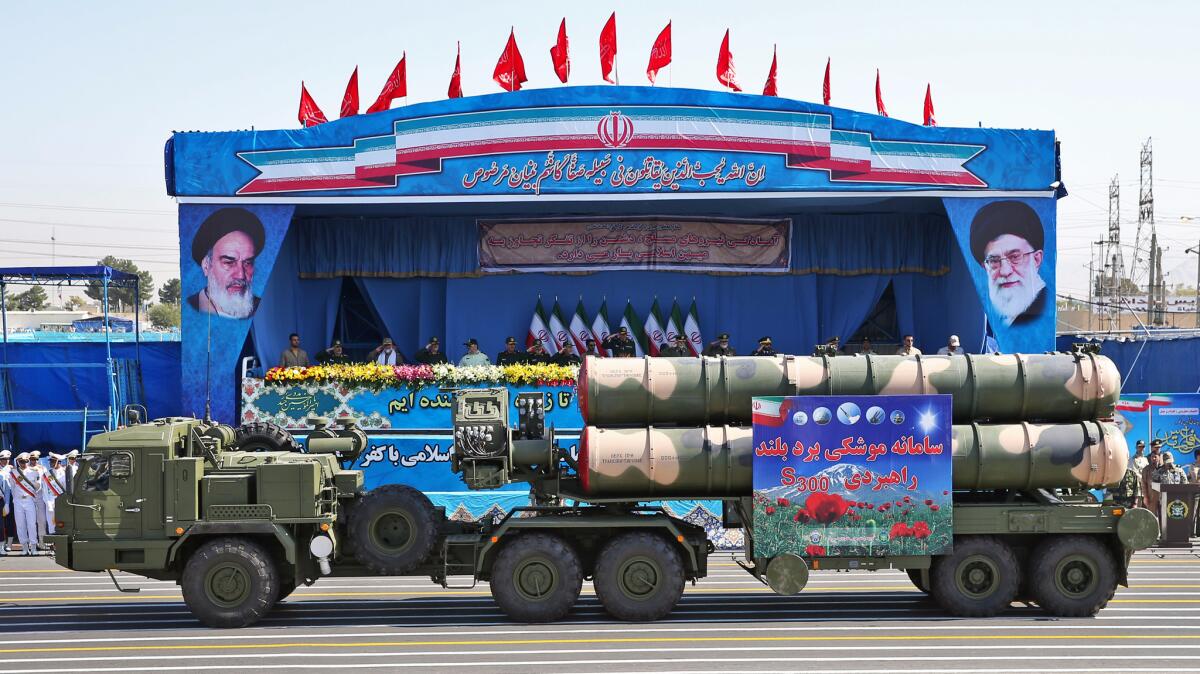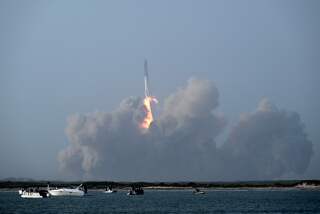Iran tests first ballistic missile since Trump took office

Reporting from Washington — The Iranian government carried out a medium-range ballistic missile test Sunday that may be a violation of a United Nations Security Council resolution, U.S. officials said.
The launch, which took place at a site more than 130 miles east of Tehran, is Iran’s first real test of the Trump administration.
The missile was tracked flying southward 650 miles before exploding when its reentry vehicle failed, according to officials who weren’t authorized to speak publicly on intelligence.
The missile has been tested before, officials said, most recently in July 2016.
White House spokesman Sean Spicer told reporters Monday that the administration was aware the test took place, but wouldn’t provide additional information.
“We’re looking into that,” he said. “We’re aware that Iran fired that missile. We’re looking into the exact nature of it, and I’ll try to have more for you later.”
Iran was among the seven predominantly Muslim countries targeted in President Trump’s controversial executive action signed Friday that blocked its citizens from entering the United States.
Christopher Harmer, a military analyst at the Institute for the Study of War, a nonpartisan public policy group in Washington, said that it’s impossible to know if Tehran conducted the test as a response to the president’s action, but that the test also serves as propaganda.
“Iran is always working on every aspect of its missile program: better guidance, more payload capacity, and better reliability,” he said. “They test often so it’s difficult to say for sure whether this is a response to the travel ban, but the timing is suspect.”
Trump, as a presidential candidate, was deeply critical of the landmark 2015 nuclear deal with Iran, calling it “the worst deal ever negotiated.”
Iran had agreed to strict constraints on its atomic program in exchange for an end to economic sanctions that had throttled the nation’s economy.
U.N. Resolution 2231, passed shortly after the nuclear deal was signed, calls on Iran “not to undertake any activity related to ballistic missiles designed to be capable of delivering nuclear weapons, including launches using such ballistic missile technology.”
The U.N. will now determine whether the launch was a violation.
Iran has repeatedly maintained that missile development is within its rights to self-defense against attack from Israel, its longtime regional adversary. The missile arsenal was never designed to be tipped with nuclear warheads, Tehran has said, therefore it should face no U.N. restrictions.
Israeli Prime Minister Benjamin Netanyahu posted a statement on his Facebook page that called the test a “flagrant violation” of the resolution. He added that he intended to “raise the renewal of sanctions against Iran in this context and in other contexts” when he meets Trump at the White House on Feb. 15.
Twitter: @wjhenn
ALSO:
Climate change is real: Just ask the Pentagon
Overweight, tattooed, stoned? The Pentagon may still want you
More to Read
Sign up for Essential California
The most important California stories and recommendations in your inbox every morning.
You may occasionally receive promotional content from the Los Angeles Times.











